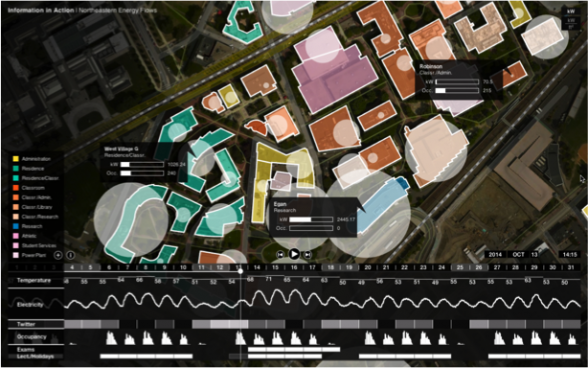People In This Story

Departments In This Story
Institutions like Northeastern University use massive amounts of energy from heating and cooling classrooms to operating thousands of university computers. Energy consumption is necessary for the functioning of the university and the comfort of its occupants – it is an expression of the activities happening on campus. Yet, as citizens of Northeastern University, we rarely think about the energy cost involved, or the carbon footprint we generate when we ask the Facilities Department to raise the temperature of our office, when we leave computers on for the weekend, or fail to turn off classroom lights when we exit. Funded by a Northeastern University Tier 1 grant and a CAMD faculty grant, Associate Professor Kristian Kloeckl, is developing an interactive data visualization system that will provide institutions with tools to better learn how energy is used in various locations in the institutional community with an eye towards creating awareness, generating cost and savings and maximizing comfort.
The project, “Institutional Data and Energy Flows,” involves remote sensing, real-time systems data analysis and data visualization and uses Northeastern University, Boston campus, as test case study for the project. Kloeckl states the project will help answer the question “What drives institutional energy consumption in an environment where use patterns, climatic conditions and technology systems are in constant change?” To observe and validate the proposed systems data-based modeling approach, Kloeckl’s team, along with the Northeastern Facilities Department, will equip an appropriate university building with wireless sensor notes equipped with tools such as electricity meters, photometer, temperature sensor, and motion sensors that will measure energy output and usage in various rooms. Assisting Kloeckl on this project are Professor Matthias Ruth, Director of the School for Public Policy and Urban Affairs and Professor Guevara Noubir, College of Computer and Information Science.
Kloeckl said “Moving forward, my focus in the project will be on how to bring energy systems data back into a ‘conversation’ with all community stakeholders.” He hopes enabling feedback and interactions between energy system operations and residents will help institutions to “…modulate energy usage in a way that may reduce overall consumption while contributing to higher levels of actual perceived comfort.”
This project was the topic for a graduate studio he taught last year with the “Information Design and Visualization” program. Graduate students who participated in the class and assisted with research were: Skye Moret, Xiaxin Chen, Xuan Zhang, Xiangyi Fu, Jessica Hopkins, Mahima Pushkarna, Armin Akhavan, Aldo Viramontes, Jin Wang, Yangdong Ye; Corey Hoard (Teaching Assistant),
Kloeckl has presented results of this project to IEEE International Smart Cities Conference in Guadalajara, Mexico and Hybrid City 2015 conference in Athens, Greece. For more information about this research project and to read his publications see his website , “Data Orchestra | Northeastern Energy Flows.”





